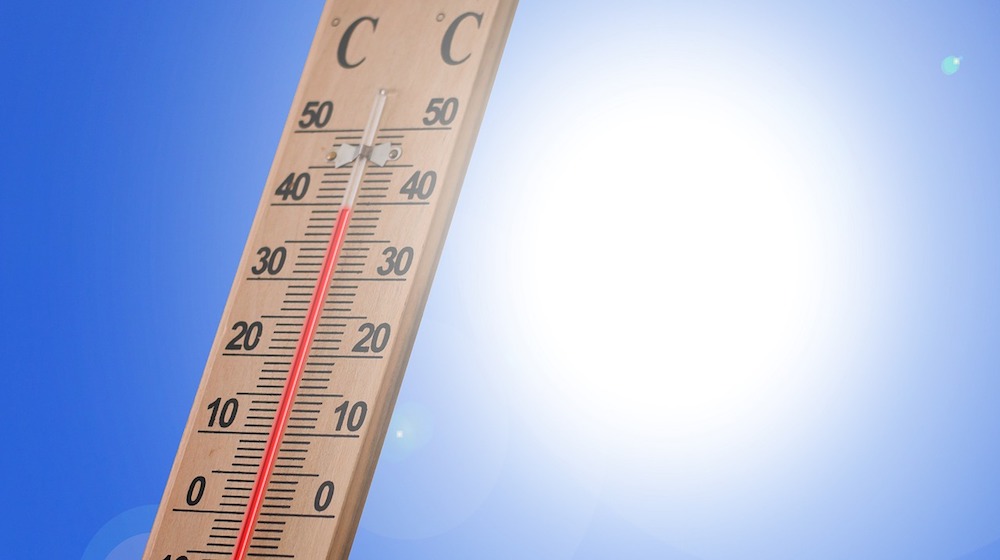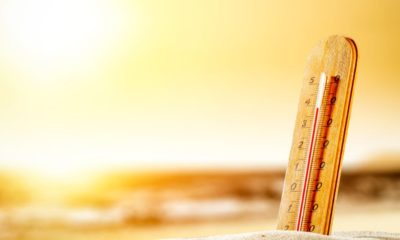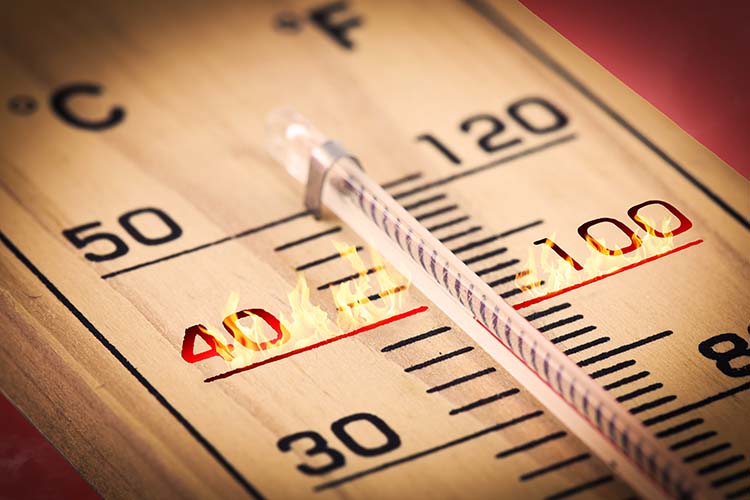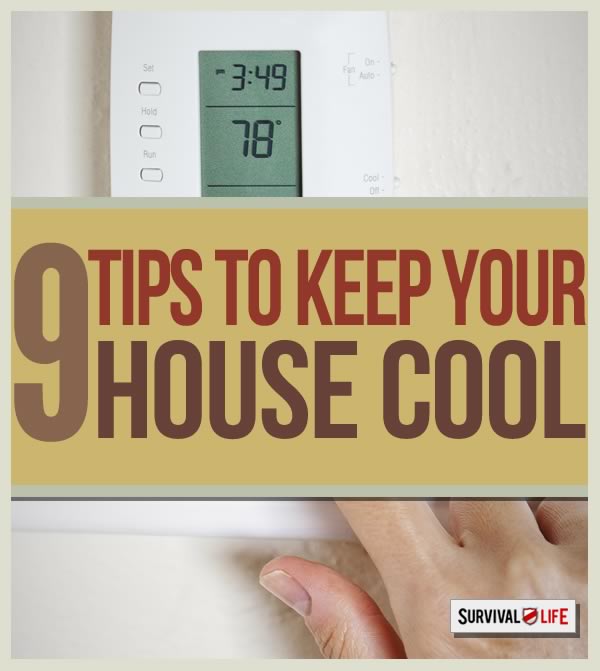Featured Articles
Making Sure You’re Not Another Summer Statistic

July and August are the hottest months during summer, and with those outdoor adventures and trips you have planned, the heat can turn any fun activity into a survival situation, and possible a life or death situation.
That being said, it is always a good idea to always plan ahead and to take the necessary precaution and maneuvers, so you can prevent these situations, or at least be prepared when they arise.
You ask what in the world am I talking about, I’m talking about heat disorders (also called hyperthermia), and the fact that they can ruin any planned outdoor adventure or vacation.
Heat disorders are a group of illnesses caused by exposure to hot temperatures (the sun) for an extended period of time, restricted fluid intake, or failure of the body’s ability to regulate its temperature. The four most common heat disorders include:
-Sunburn
-Heat Cramps
-Heat Exhaustion
-Heat Stoke
Sunburn:
A sunburn is a mild heat disorder, but at the same time, they can be quite painful and debilitating in a survival situation.
Sunburns include red painful skin. However in severe cases, you may have swelling of the skin, blisters, fever, and/or headaches.
Treating sunburns is relatively simple and easy. Make sure to first get out of the sun, or find the shade.
If there is no blistering, or you have blisters that aren’t open, apply cool Aloe Vera gel and/or cover with a cool wet cloth or dressing, and if there is blistering, with open wounds, cover the sunburn with a dry sterile dressing.
However if it’s more serious, then you should seek medical attention.
Like I said, sunburns are considered a mild heat disorder, however, anything that causes damage to your skin can quickly lead to debilitating conditions, especially if you are in a situation where bathing and other day to day hygiene activities might not be an option.
Basically, a sunburn may be on the low end of the totem pole when it comes to heat related disorders, but that doesn’t mean you need to take them any less seriously than the others…
Heat Cramps:
Like sunburns, heat cramps are one of the more mild heat disorders.
If you suffer from painful spasms, usually the legs, and abdomen, you may be suffering from heat cramps. In some cases, heavy sweating can also be involved. From my own personal experience, suffering from heat cramps feels like thousands of small needles are constantly poking and pricking you.
Warning, heat cramps are a sign more serious problems are on the way if you don’t treat them!
To overcome heat cramps, put firm pressure on cramping muscles or gently massaging the muscles will help relieve spasms. Also, be sure to hydrate, hydrate, HYDRATE!
Heat exhaustion is an more serious condition than heat cramps and sunburns. Symptoms include heavy sweating, weakness, cold skin – pale and clammy, dark yellow or orange urine, a weak pulse, vomiting, and fainting. It is critical that you to treat heat exhaustion right away!
If left untreated, it could lead to a heat stroke, or even worse…
To treat heat exhaustion, be sure to get the victim out of the sun and in a dry cool place with AC, then ss-100708-heat-01.grid-8×2 apply cool wet cloths, while making sure they hydrate. If nausea occurs and you have continual vomiting, seek medical attention right away.
Heat stroke (sunstroke):
Heat stroke is very dangerous and can be fatal if not caught in time. Symptoms include high body temperature (105 F or higher), hot dry skin. a rapid pulse, and eventually loss of consciousness. If not treated right away, brain damage, and or death can occur.
To treat a heat stroke, it is best to seek IMMEDIATE medical attention – get them to the hospital if possible, if not, place in a cool room with AC, take off their clothing, and do not administer fluids.
Heat disorders can and will be serious and fatal if not taken care of when you have the chance. Before you go on your next outdoor adventure in the raging heat, make sure to plan ahead, and know the symptoms of heat disorders, so you can take immediate action if they do indeed occur.
Click here to view the original article
Editors Note: Summer is in full force, and even though (this week) we are getting a bit of a reprieve from the heat here in Texas, we are nowhere near being out of the woods yet. Make sure that whey you venture outdoors this summer, no matter where you are, you are aware of the above signs and prepared to treat them at a moments notice.
Heat related illness kill thousands in the U.S each year.
Make sure that you don’t end up as just another statistic.
Heat Stroke vs. Heat Exhaustion: Know the Signs and Symptoms
Heat Stroke: Signs, Symptoms and Prevention
Heat Exhaustion: Signs, Symptoms and Prevention
-

 Do It Yourself7 months ago
Do It Yourself7 months agoParacord Projects | 36 Cool Paracord Ideas For Your Paracord Survival Projects
-

 Do It Yourself9 months ago
Do It Yourself9 months agoHow To Make Paracord Survival Bracelets | DIY Survival Prepping
-

 Do It Yourself9 months ago
Do It Yourself9 months ago21 Home Remedies For Toothache Pain Relief
-

 Do It Yourself10 months ago
Do It Yourself10 months agoSurvival DIY: How To Melt Aluminum Cans For Casting
-

 Exports8 months ago
Exports8 months agoAre Switchblades Legal? Knife Laws By State






terry
July 19, 2013 at 8:47 AM
This is especially important as we age. Although we may feel the same as we did when we were younger, our bodies say differently. One of the problems we may face is not feeling the heat the way we did when we were younger. Two years ago, at the not-so-old age of 52, after spending hours of a 90-degree day whacking weeds, then spending the night and most of the next day with my daughter who was in labor, my blood pressure dropped to 66/33. I felt as if I were dying (and I was). I was rushed to the hospital where they told me I was dehydrated and that’s why my bp dropped so low. I was put into the hospital for a couple of days. I’m always careful now not to work so hard in hot weather.
William
July 22, 2013 at 12:31 PM
One shouldn’t play to hard either, during the summer. One weekend during Kansas’ 40 days of 100+ degrees summer of 1980, I was at Ft. Riley at sumemr camp. On Saturday and Sunday I spenmt most of the day in the pool and had several sodas each day. Monday morning I woke up and could barely move, had a roaring headache, and no appetite. When I reported to sick call, they said I was dehydrated. I asked how could it be since I was in the pool surrounded by water all weekend.
Number one answer, when surrounded by water, especially with chemicals in it your body starts to move water out of you to balance the environment. We don’t notice this normally, but I was in the pool for 12-15 hours both days. Number two answer, I was drinking sodas instead of water, so I was not rehydrating (soda acts as a diuretic, btw). So moderation in ALL things is key!
FaeWolf
July 24, 2013 at 2:37 AM
Be especially careful with heat related illnesses. Once you have heat related illness like heat exhaustion or heat stroke you are more prone to them in the future. Dehydration can strike morning, afternoon, evening, in dry heat, humid heat, or when it’s cold. Water is very important. If you become thirsty chances are you are mildly dehydrated already. If you are experiencing dry mouth, headaches, cramping muscles, even a light headed feeling, if you aren’t sweating or urinating.
All these are progressive signs of dehydration. In a survival situation people either won’t have the proper gauge needle to be able hit your vein if they are lacking the water content in your blood to keep them from going flat. So there should be nothing keeping you from drinking water. Any food you eat drink the juice. If killing animals for meat drink the blood before cooking the meat. These are for survival if no other water is around. If you have water drink and carry to injured or elders who fight or stand guard in the family in your group. People die of thirst from dehydration with a canteen full of water be cause they were trying to save it. Those people were found still with that full canteen of water. Don’t drink highly sugary drinks like sodas too much sugar in deinks can your blood sugar can crash. Or highly caffeinated beverages such as coffe or black tea diuretic and will make you urinate more even before your body has gotten any good by drinking it. Types of drink are very important in survival situations just as much as how you drink. Herbal tea has certain ingredients that may promote healing illnesses depending on what they are. Absolutely no liqueur this not only can make you make poor choices in a life or death survival situation but also alcohol is a depressant, a diuretic and a serious blood thinner. If injured a man can bleed out if drunk on whiskey before the wound is staunched or stitched or cauterized. And feel pissy as shit to be in his particular situation. And none too soon he’ll be needin a toilet or new trousers. Fighting dehydration bad enough with out adding to it. So keep the whiskey for tradin or for sterilizing and use the water instead.
Water is easier for the human body to absorb when it is room temperature. Too chilled and your body must expend energy warming it once it has been drunk to body temperature to do any good for your cells to be able to do anything with. Never pass up an oppotunity for clean water. It may be a few days till more comes to you.
gena
August 2, 2013 at 11:15 PM
When I was a kid growing up in Austin, TX in the 50s, every school year, toward the end of the school year, while in elementary school, the entire class would spend an entire day at one of the public swimming pools as our annual class end of year party. Without fail, I would get a bad sun burn, with blisters. My mother tried to get the school to allow me to wear a tee-shirt over my swimming suit, but the school would not allow it as “girls don’t wear tee-shirts.” And the sun burns don’t usually show up until an hour or two after you get out of the sun. My face and nose, in particular, would be burned and blistered, and my shoulders and the part of the back over the swim suit would be blistered so badly I would be in extreme pain and usually ended up missing the next day of school. Now they say that sunburns like that, where you have had blistering often lead to skin cancer. I am the only one in my family who, so far, has not had skin cancer, probably because my extreme sun exposure was limited to that one day a year during elementary school. Unlike most of my girl friends I never went out in the early spring or summer to roast my body in the yard to get a tan, or like my brothers, both of whom have had skin cancer, they would go out to earn money mowing yards with no shirt on to get a tan. I always felt that lying in the sun was akin to playing like you were a roast on a spit, so avoided it. Most of the family members have had their skin cancers on the face, around the nose. My father, mother, sister, and both brothers have had skin cancer, one of the brothers, has had his skin cancer over and over, and it is apparently serious. This is for the most part sun exposure related, according to the medical authorities. Of course, all this was way before people related skin cancer to sun exposure or the idea of sun screen even existed. All I can remember offered at that time to put on your skin was Coppertone, to increase the sun tan that most people aspired to back then. That is why so many women my age who have grown up in Texas have such leathery skin, with incredible wrinkles, sun and tan worship. I admit I take more after my mother who used to say her idea of roughing it was staying at a motel that did not have central air conditioning.
One last comment, when you are out on the water, boating, the reflection of the sun on the water can increase your chances of a severe sun burn, which, again, you are not likely to realize you have until two or three hours AFTER you get out of the sun.
Pingback: 10 Summer Survival Tips: Beat the Heat Without AC | Survival Life